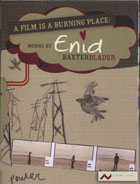
A Film is a Burning Place: Works by Enid Baxter Blader 2009
Distributed by Microcinema International/Microcinema DVD, 2169 Folsom Street, Suite M101, San Francisco, CA 94110; 415-447-9750
Producer n/a
Directed by Enid Baxter Blader
DVD, color, 101 min.
College - Adult
Film Studies, Media Studies
Date Entered: 10/14/2009
Reviewed by Oksana Dykyj, Head, Visual Media Resources, Concordia University, MontrealThe advice, “write what you know”, also applies to making films. This disc provides us with the journey of the maturation and evolution of Enid Baxter Blader’s filmic voice. Her films show the development of a filmmaker in essentially 7 years of making movies. The earliest works range from the level of a high school media class filmmaking project where the narrative and style are completely derivative of Hollywood movies and lack any personal sensibility or sense of direction, to the mid-period where experimentation completely takes over but content is lacking, to finally her most recent project Local 909er, where she has plenty to say and does so in a creative and compelling way.
Baxter Blader’s website provides information about her films. After watching Lucille (2003), I wondered whether the film was intended as a spoof of bad soft-core films from the early 1960s. I also thought that it may be a humorous attempt at a heterosexual send-up of Kenneth Anger’s Kustom Kar Kommandos (1965) in which a man fetishizes a hot rod by obsessively polishing it. The website notes indicate that the film is not unfortunately intended as a spoof. Rather, the film unflinchingly presents a zaftig woman in a cheap Frederick’s of Hollywood type of baby doll nightie washing a motorcycle in a highly sexualized manner with a hose. The motorcycle in question is completely uninteresting as an object to motorcycle enthusiasts, and looks rather silly and tiny as the woman towers over it and engulfs it. According to Baxter Blader’s notes, the film intends to re-enact a scene in Cool Hand Luke. The camera angles, the editing and the whole concept of this film are rather amateurish and do not display a good comprehension of standard filmmaking techniques. The artist may argue that the bad technique is intentional but that argument can only possibly stand if it were a send-up and not when it is intended as a serious film. Lucille as well as the earlier excerpt from Letter from the Girl (2002) and Corn (2001), a very ineptly exposed shot of a field of corn, should be cast aside as early student filmmaking exercises and removed from view so as to not confuse viewers looking at her most recent work. The advice given to student filmmakers is to know how to throw away shots, how to edit down their films. It is encouraging to see how she has progressed in the last seven years but having included these particular three films on the compilation does her a great disservice. It’s analogous to including high school babysitting jobs on one’s post-doctoral résumé.
The only film worthy of actually recommending this DVD is Local 909er (2008). It documents the California Ms. Baxter Blader knows and has lived in for years. It shows the sadness of the thriving theme malls, the suburban sprawl that mars the landscape, the changing attitudes of the long-time inhabitants. She is able to record some very touching and iconic images of a young woman who no longer identifies with her mother’s ideals of living with horses. Her thoughts are captured by the filmmaker as she exercises one of her mother’s horses. This scene is extremely moving and Enid Baxter Blader’s camera clenches the palpable emotion emanating from the young woman. This scene alone is the reason for her to continue making films: she has found her mature filmmaking voice. Recommended for only one of the films on the DVD.